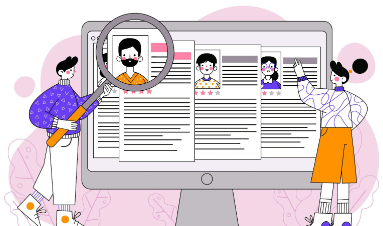Introduction to Soft Skills and Emotional Intelligence
Welcome to the world of job hunting and career success! As you embark on the journey of landing your dream job, it’s important to remember that it takes more than just technical expertise to impress employers. In today’s competitive market, soft skills have become a crucial aspect of what sets candidates apart. And at the forefront of these desirable qualities lies emotional intelligence.
But what exactly are soft skills and why should they be showcased on your high quality resume? Soft skills refer to a set of personal attributes that enable individuals to effectively interact with others. These intangible qualities go beyond academic qualifications and technical know-how, encompassing traits such as communication, adaptability, teamwork, leadership, and problem-solving abilities.
Nowadays, employers recognize that possessing strong emotional intelligence is just as valuable as having an impressive list of hard skills. Emotional intelligence encompasses self-awareness, empathy towards others’ feelings and needs, effective communication in both verbal and non-verbal forms, as well as managing one’s emotions in a professional setting.
Why Soft Skills Are Important on Your Resume
Soft skills are an essential part of any successful career. While technical expertise and qualifications may land you an interview, it is your soft skills that can truly set you apart from the competition. These intangible qualities demonstrate your ability to communicate effectively, work well in a team, adapt to change, and handle difficult situations with grace.
Employers recognize the value of soft skills because they contribute to a positive work environment and help foster strong relationships among colleagues. Companies want employees who can collaborate, problem-solve, and navigate conflicts with empathy and emotional intelligence.
In today’s rapidly changing professional landscape, where technology has automated many tasks once performed by humans, soft skills have become even more crucial. They cannot be replicated or replaced by machines but are deeply rooted in human nature. Employers understand that individuals who possess these skills are better equipped to handle ambiguity and uncertainty.
When highlighting soft skills on your resume, consider using specific examples that illustrate how you have applied them in previous roles or situations. For instance: “Led a cross-functional team through a challenging project by utilizing my effective communication and collaboration skills.”
The Top Soft Skills Employers Look for in Candidates
When it comes to standing out in the job market, having a strong set of soft skills is essential. Employers are not just looking for candidates with impressive technical abilities; they also want individuals who possess the right blend of interpersonal and emotional intelligence. So, what are the top soft skills that employers value?
One key skill is communication. Being able to effectively express ideas, actively listen, and adapt your communication style based on the situation can make a significant impact in any professional setting.
Another important skill is teamwork. Employers want individuals who can collaborate well with others, contribute their unique perspectives, and work towards common goals as part of a cohesive team.
Problem-solving ability is also highly valued by employers. Being able to analyze complex situations, think critically, and come up with creative solutions demonstrates your resourcefulness and ability to handle challenges.
Leadership skills are another sought-after trait. Even if you’re not applying for a managerial position initially, showing that you have the potential to inspire and guide others can set you apart from other candidates.
Adaptability is crucial in today’s rapidly changing workplace. Employers want employees who can easily adjust to new technologies or processes, navigate uncertainty with grace, and embrace change as an opportunity for growth.
Having strong emotional intelligence is becoming increasingly important in the workplace. This includes self-awareness (understanding your own emotions), empathy (being able to understand and relate to others’ emotions), and emotional regulation (managing emotions effectively).
By showcasing these top soft skills on your resume or during an interview, you’ll demonstrate that you have what it takes to excel in any role or industry – making yourself an attractive candidate for prospective employers!
Tips for Developing and Improving Your Emotional Intelligence
Developing and improving your emotional intelligence is a valuable skill that can greatly enhance your personal and professional relationships. Here are some practical tips to help you cultivate this important trait.
First, start by becoming more self-aware. Take the time to reflect on your own emotions and reactions in various situations. Pay attention to how certain events or interactions make you feel, and try to understand why you may react in a particular way. This self-reflection will enable you to better understand yourself and how your emotions impact others.
Next, work on developing empathy towards others. Put yourself in their shoes and try to understand their perspective. Ask open-ended questions during conversations, actively listen without judgment, and show genuine interest in understanding others’ thoughts and feelings.
Another crucial aspect of emotional intelligence is managing your emotions effectively. Practice techniques such as deep breathing or meditation to help calm yourself down during stressful situations. Learn healthy coping mechanisms for dealing with negative emotions like anger or frustration.
Effective communication is also key when it comes to emotional intelligence. Focus on improving both verbal and nonverbal communication skills by being clear, concise, and attentive when interacting with others. Pay attention not only to what people say but also their body language, tone of voice, and facial expressions.
Furthermore, building strong relationships requires trustworthiness and integrity. Be honest with others while maintaining confidentiality when necessary. Follow through on commitments made so that people can rely on you.
Never stop learning about emotional intelligence! Read books or articles related to the subject matter; attend workshops or seminars that focus on developing these skills; seek feedback from trusted mentors or colleagues who can provide insights into areas where improvement is needed.
By incorporating these tips into your daily life, you’ll be able to develop stronger emotional intelligence which will positively impact both your personal well-being as well as professional success.
How to Highlight Soft Skills in an Interview
When it comes to showcasing your soft skills in an interview, preparation is key. Here are a few tips to help you highlight your emotional intelligence and other valuable soft skills during the interview process.
Be sure to research the company and understand their values and culture. This will give you insight into what specific soft skills they may be looking for in candidates. Use this knowledge to tailor your responses accordingly.
During the interview, listen actively and demonstrate empathy towards the interviewer’s questions or concerns. This shows that you have strong communication and interpersonal skills. Additionally, pay attention to non-verbal cues such as body language – maintain eye contact and use open gestures to convey confidence.
Another way to highlight your soft skills is through storytelling. Share specific examples from past experiences where you successfully utilized these skills in real-world situations. Be concise yet detailed about how you handled challenges or conflicts with emotional intelligence.
Furthermore, don’t forget about teamwork! Many employers value collaboration and cooperation among employees. Mention instances where you worked effectively within a team setting or contributed positively to group projects.
Ask thoughtful questions at the end of the interview that reflect your curiosity, critical thinking abilities, and problem-solving skills. This demonstrates not only your interest in the role but also showcases important attributes like adaptability and creativity.
Conclusion
Emotional intelligence and soft skills play a crucial role in career success. While technical expertise may get you in the door, it is your ability to effectively communicate, collaborate, and adapt that will set you apart from the competition.
Employers today are recognizing the value of soft skills in their workforce. They understand that employees who possess emotional intelligence can navigate challenging situations with grace and contribute positively to the overall company culture.
By showcasing your emotional intelligence on your resume, you demonstrate to potential employers that you have what it takes to thrive in today’s dynamic work environment. Including examples of how you have used your soft skills to overcome challenges or achieve results will give hiring managers insight into how well you can handle complex situations and work effectively with others.
Developing and improving your emotional intelligence is an ongoing process. It requires self-awareness, empathy, active listening, and effective communication – all skills that can be honed over time. By investing in personal growth and actively working on improving these areas, not only will you enhance your professional relationships but also increase opportunities for advancement within your career.
When it comes to interviews, highlighting your soft skills is just as important as discussing technical qualifications. Take the time to prepare specific examples that showcase how you have leveraged emotional intelligence in past experiences. Use STAR (Situation-Task-Action-Result) stories to illustrate how you successfully managed conflict resolution or led a team through a challenging project.
Remember that actions often speak louder than words when it comes to demonstrating emotional intelligence during an interview or at work. Be mindful of body language cues such as maintaining eye contact, nodding affirmatively while listening attentively, and using appropriate facial expressions – all which signal empathy and understanding.



